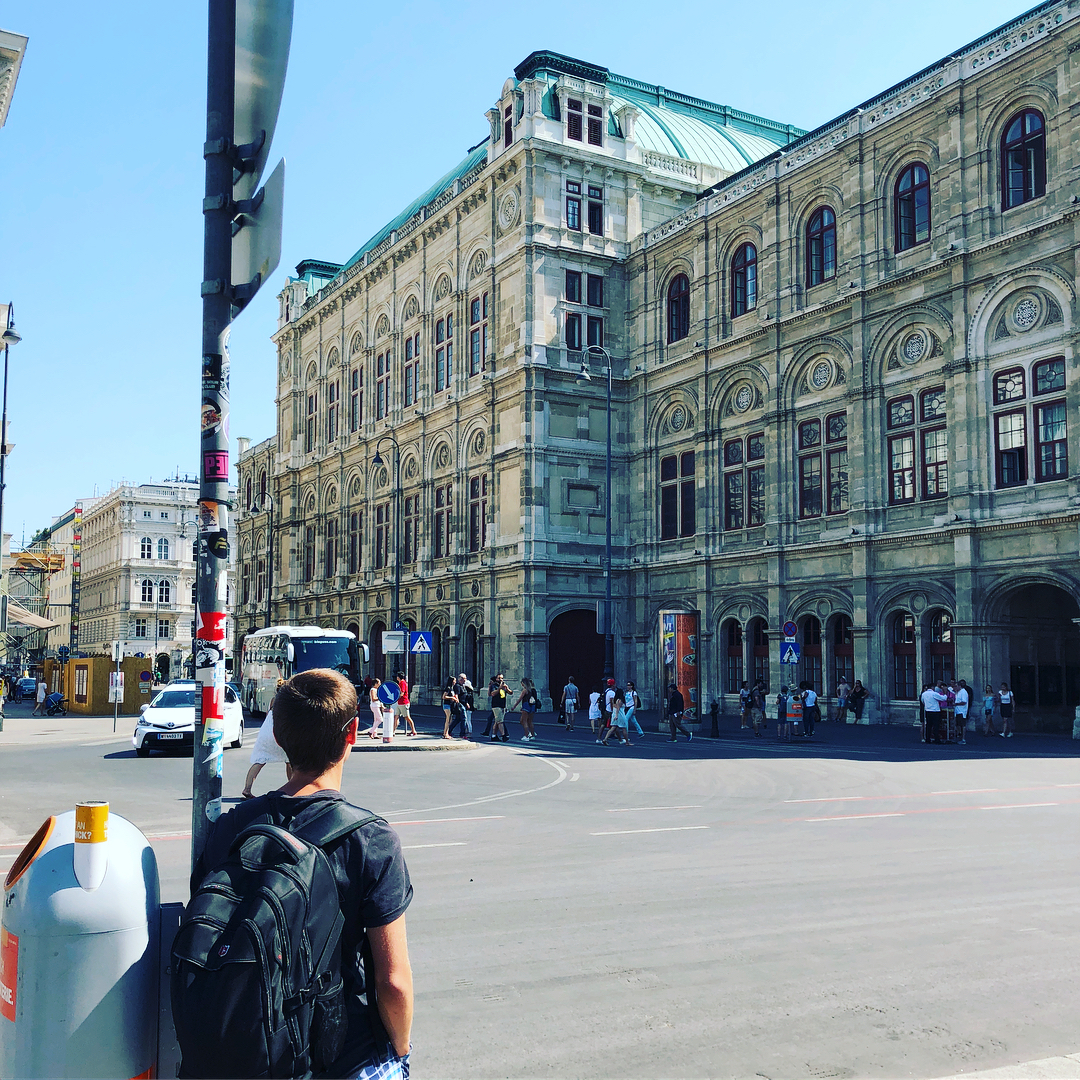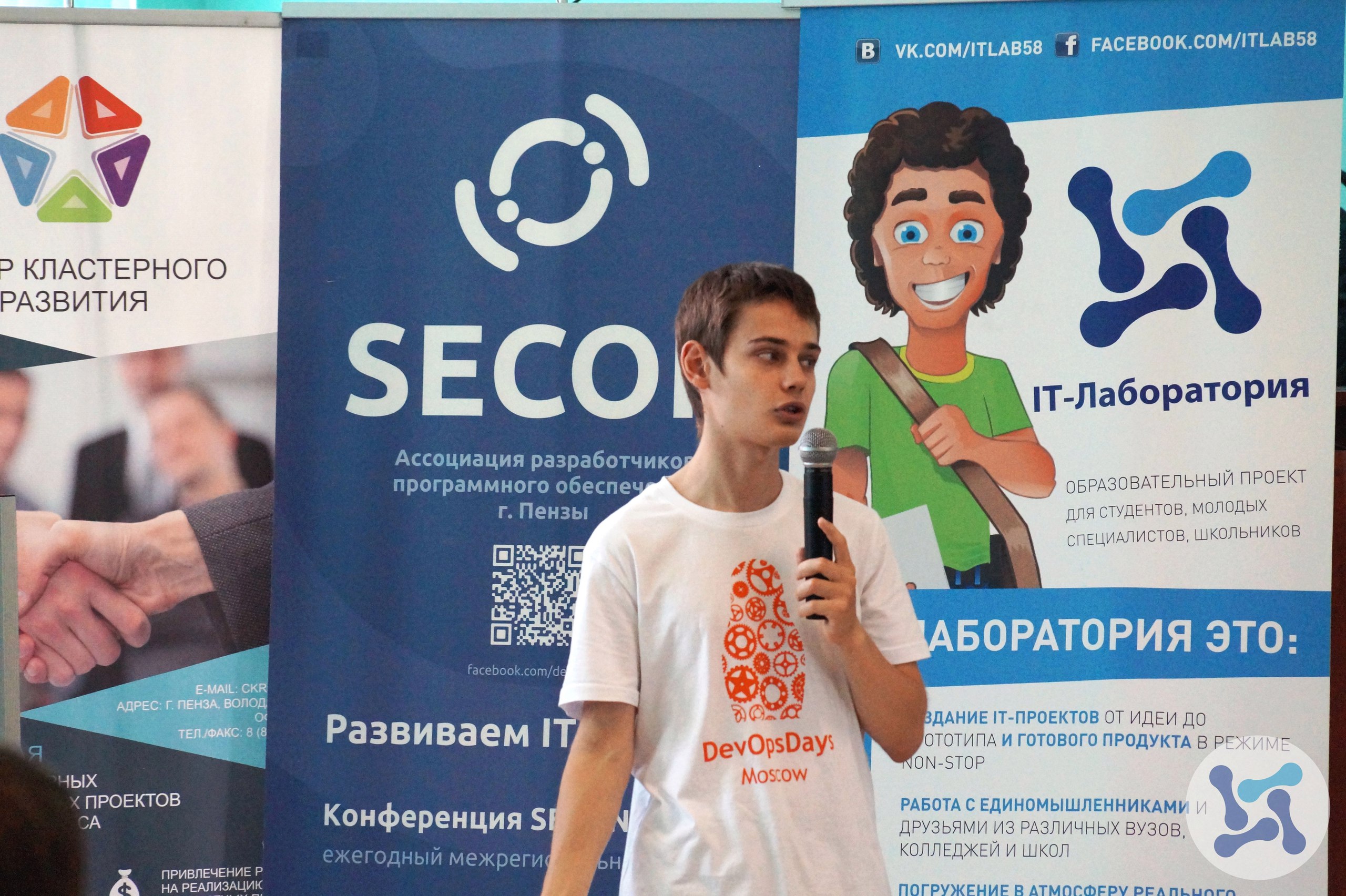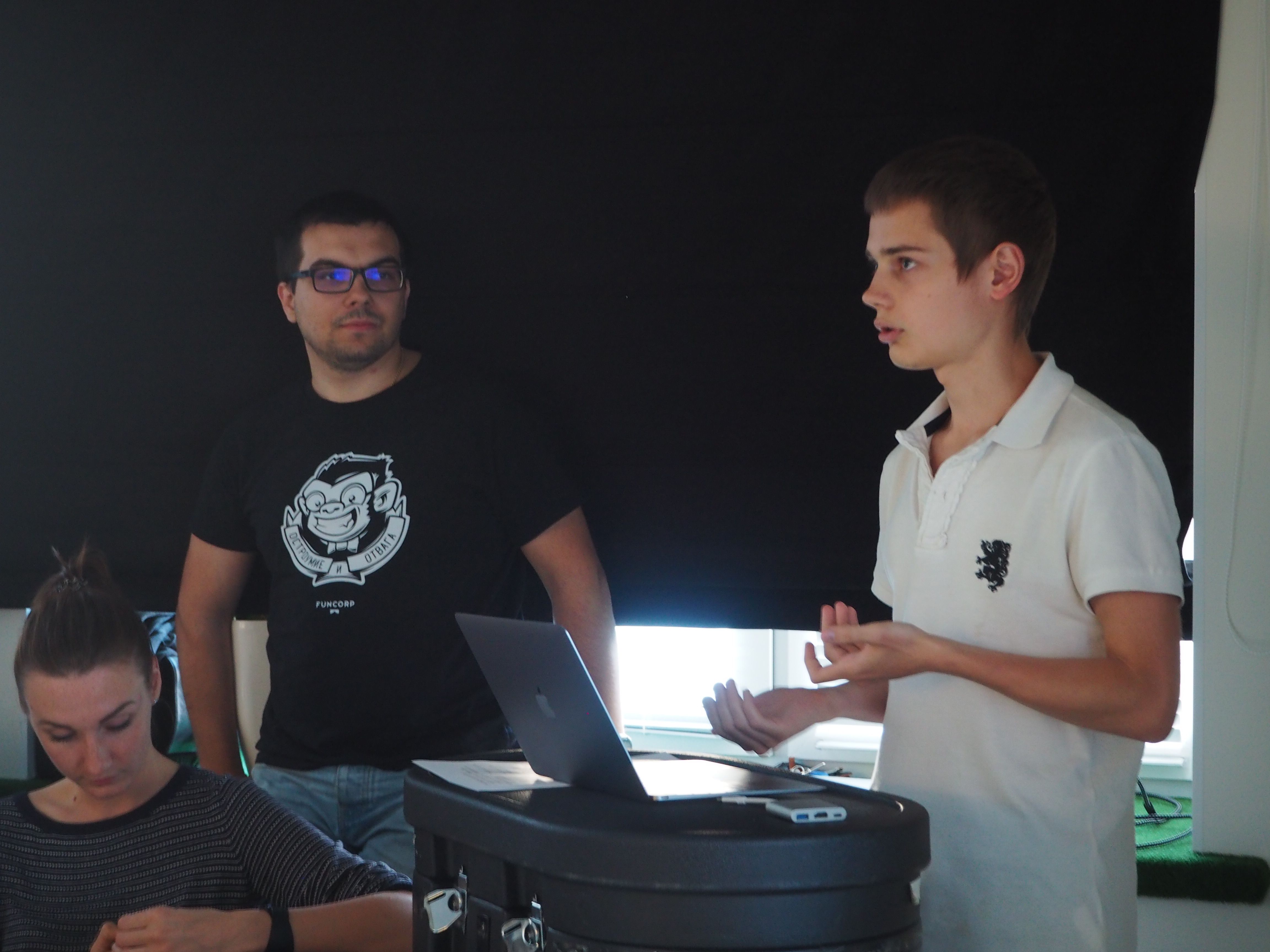
About moving
Since 2018, you have been living in Berlin. How did you make that decision? Did you consciously choose the country and company in advance where you want to work, or did you receive an offer that you can’t refuse?
At some point I was tired of living in Penza, where I was born, grew up and studied at the university, and the standard way of moving to Moscow and Peter did not attract me because of the specifics of life in these cities. So I just wanted to try living in Europe, which I have been traveling for the last couple of vacations. I had no preferences either in the company, or in the city, or even in a specific country - I just wanted to move as quickly as possible.
At that moment, I considered Berlin the most affordable city for the developer to move to a tech company, because on Linkedin, 90% of relocation-tolerant companies were from Berlin. Subsequently, I flew into the city for 3 days to conduct a couple of face-to-face interviews. I really liked the city, so I decided that I want to live in Berlin right now. A week later, I immediately accepted the very first offer that I received from the Berlin tech hub.
Please tell us more about the relocation process. How did this happen to you? Which documents did you collect? Did the employer help?
I can’t say anything new here; everything is very well written in several articles. I like the version from Vastrik’s blog , known to everyone who is interested in this issue. In the Berlin tech hub, the process is the same in almost all companies helping an engineer with relocation.
Did you encounter something unexpected and unusual in terms of organizing work, life, mentality? How long did you get used to the local life?
Yes, in fact, the whole process of working in the companies of the Berlin tech hub at first shocked me. In general, everything: from how and how much rallies are held to the role of soft skills in the life of an engineer.
For example, in Germany, a working culture is oriented towards collective decision-making, which means that literally every controversial issue creates a rally where you thoroughly discuss the problem and come to a consensus from your points of view. From Russia, such a practice initially seems to the engineer a waste of time, bureaucracy and distrust, but ultimately it makes sense, as does the distribution of responsibility for the outcome of the decision.
Such moments, as well as a lack of understanding of myself on the part of my colleagues, made me read the book “The Culture Map” and understand that all your inner indignation is more a refusal to perceive the reality of the new environment that you are in than an attempt to find the truth. After the book, it has become much easier to work, you begin to understand the meaning of phrases and decisions of your colleagues.
In terms of life, the adaptation process in a new country is much more complicated than the adaptation process in a working culture. Psychologists usually distinguish four stages of emigration through which a person passes. In this regard, my path was no exception. On the other hand, it seems to me that adaptation when moving to a multicultural center such as Berlin, London and Barcelona is obviously easier than in any classic city.
After two years of living in Berlin, what do you like and dislike about this city?
It’s hard for me to make a list of the pros and cons of the city, because Berlin quickly became my home in every sense of the word.
I think that I have been striving all my conscious life for freedom in all its manifestations: physical, social, financial, political, spiritual, mental. Yes, the same freedom in work, I do not like control from above and micromanagement, when they constantly tell me what and how to do it. In these matters, Berlin seemed and still seems to me to be one of the freest cities in the world because of free views on life in society, relatively liberal prices for rental housing and other needs, as well as many opportunities to pump your freedom in other aspects.

About work in Berlin
Which stack is the standard in Berlin startups? How does the stack differ from the average in Russia?
From a technology point of view, local stacks subjectively seem boring to me if they are not FinTech companies. Most startups and those who transitioned from startup to enterprise were founded in 2010-2012 and started with the simplest architecture: a monolithic backend, and sometimes with a frontend built into it, the language - either Ruby, or PHP, or Python, must use frameworks, the base on MySQL, cache on Redis. Also, according to personal feelings, 90% of companies have all AWS production.
Now everyone has a tendency to cut the monolith into microservices, wrap them in containers, deploy it to Kubernetes and rely on Golang as the standard language for new applications. This happens very quickly, so in most companies the main functionality is still buried in the monolith. I am far from the front-end, but there is usually the standard is React.
Large tech companies like Zalando and N26 are trying to bring more technology to the service so that there is nothing to lure goal-oriented developers on the market. Other tech companies are also striving to keep up with the latest technologies, but from the outside it is clear that they are under pressure from a monolithic architecture and technical debt accumulated over the years.
As an engineer, I take this quite calmly, because in the tech hub of Berlin there are a lot of interesting companies from a product point of view. In such companies it is more interesting to work for an idea and a product that you personally like, rather than consider the company as a place with a fashionable technical tech that you definitely need to work with.
What is the difference between the life and work of a developer in Russia and in Germany? Are there any things that surprised you?
In Germany, as in any other country in Northern / Central Europe, things are better with work / life balance and relations between colleagues, but worse with the speed of work. At first, it was unpleasant for me to get used to internal projects that take a couple of months, when similar projects took a couple of weeks at tech companies in Russia. In fact, this is not scary, because there are objective reasons why, and companies usually do not perceive such situations critically.
Otherwise, it’s quite difficult for me to draw a parallel between Germany and Russia, because I have no experience working in well-known companies such as Yandex and Tinkov, where the situation may be similar to the Berlin tech hub.
For myself, I noticed that in Berlin the priority is to create a comfortable working atmosphere in companies, regular internal events and the versatility of colleagues with whom it is always interesting to talk on topics that are remote from IT. But I think that it depends more on the company where you work than on the country.
According to your observations, which specialists are in demand in Germany? Are there any specialists related to DevOps?
Most companies have a problem with perceiving the DevOps culture and understanding of what DevOps really is. However, there are a lot of vacancies with the DevOps prefix, and this clearly shows the demand for specialists in the market.
At the moment, in local IT, all current trends are equally in demand. I can only highlight the great demand for Data Engineer / Data Analyst.
Let's talk about salaries, how much does a DevOps engineer really earn in Germany?
It is difficult to answer this question, because IT is still a young industry where there are no specific standards for wages. As elsewhere, the size of the salary is more dependent on the experience and qualifications of the engineer. It is also important to perceive the figure as a salary before taxes and various social / insurance deductions. Another salary in Germany is very dependent on what city you work in. In Berlin, Munich, Frankfurt and conditional Göttingen, the range of salaries is slightly different from each other, as well as living expenses.
If we talk about Berlin, the main plus for a career is that the demand for an engineer is still higher than the supply, so salaries can grow quickly if desired. The main disadvantage is that most companies do not have a clear policy for the revision of wages, as well as criteria for evaluating the contribution to the product created by the company.
The numbers can be found in the latest German survey , StackOverflow or Glassdoor . The statistics are updated from year to year, so I will not take the responsibility to talk about the range of salaries.

Can you give some advice on what to do if you work as a conditional Site Reliability Engineer and want to move to Germany? Where to begin? Where to go?
I don’t think I have any special advice to the reader. Is it possible not to be afraid of anything, to rationalize less before moving and to be open to all the difficulties that one may encounter in exile. And there will be difficulties.
Is there a strong DevOps community in Berlin? How often do you go to local events? Tell us a little about them. What are they like?
I rarely go to meetings, so I can’t say what are the features of the local DevOps community. Hope to catch up next year. I can only share my impressions of the huge number of thematic groups on meetup.com: from the fanatics of Python and Golang to the lovers of Clojure and Rust.
Of the rallies I visited, the HashiCorp User Group is very good - but there rather I basically like the HashiCorp community with its groups in different cities.
I read that you moved without German. How are you doing after a year? Is German necessary for work or can I do without it?
I learned German, now the language level hangs between B1 and B2. All contacts with the Germans from my first year of life in Berlin are still in English, because it’s easier for both sides, and I start all new contacts with German. The immediate plans are to advance in training, to consolidate knowledge by passing an exam for a B2 certificate, because I want to communicate more confidently, to read classical literature in the original.
In Berlin, the language is needed rather for adaptation in the country, gaining a sense of inner comfort and full access to the leisure sphere (theater / cinema / stand-ups), however, the language is unlikely to be needed in the work of Software Engineering. In each company, English is the official language of the Engineering Department, even in large German companies like Deutsche Bank, Allianz and Volkswagen.
The main reason is staff shortages, the status of the city as an international cultural center, and many expats who have problems learning the German language. However, each company offers weekly German courses during working hours at the expense of organization to make life easier for employees outside of work.
For all two years of contacts with companies and recruiters, I was only contacted in German two times. In exceptions of this kind, the level B1 / B2 is usually sufficient for work. Like Americans with English, Germans calmly perceive your speech errors, because they understand that the language is not easy.
In your telegram channel, you write that DevOps is not the ability to twist Kubernetes and Prometheus, but culture. In your opinion, what do companies need to do to develop the DevOps culture in a team not just in words but in deeds? What are you doing at home?
I think, first of all, you need to be honest and put all the “dots over i” on the issue of distribution of responsibility for the product. The main problem that DevOps solves is the transfer of responsibility and the problems associated with this responsibility through the wall. As soon as people realize that sharing responsibility is beneficial for both the company and the engineers, things are moving off the ground and you can do the exact work: tuning Delivery Pipeline, reducing the Deployment Failure Rate and other things by which you can determine the status of DevOps in the company.
In my career, I have not yet promoted DevOps from the point of view of the technical lead or CTO of the company, I always spoke from the position of an engineer who knows something about DevOps. In fact, in DevOps the position of the culture driver is really important, especially the sphere of influence of the driver and its leadership qualities. My last company initially had a relatively flat hierarchy and atmosphere of trust between colleagues, and this greatly facilitated my goal of promoting culture.
Answering a specific question, what can be done for the benefit of DevOps. In my report on DevOpsDays, the main idea is that in order to develop the DevOps culture, you need to deal not only with technologies in the infrastructure, but also with internal coaching and the distribution of responsibilities in technological processes.
For example, we spent two months working as an engineer on creating a platform for QA and PR-servers for the needs of developers and testers. However, all this amazing work will sink into oblivion, if the information about the possibilities is not correctly reported, the features will not be documented and the training of employees will not be completed. And vice versa, after high-quality workshops and pair programming sessions, the purposeful engineer is inspired by new useful functionality and already solves the following problems that intersect with the infrastructure platform.
If you want more questions about DevOps, here is an interview in which Misha answers in detail the questions “Why do I need DevOps?” And “Should I create special DevOps departments in the company?”
About development
In your channel, you sometimes recommend professional articles and blogs. Do you have any favorite artistic books?
Yes, I try to find time to read fiction. I can’t read a specific writer in one gulp, novel after novel, therefore I am mixing Russian and foreign works. Of the Russian writers, I like Pelevin and Dovlatov more, but I also like reading classics of the 19th century. From overseas, I am impressed by Remarque and Hemingway.
There you write a lot about travels, and in the results of 2018 you wrote that you visited 12 countries and 27 cities. This is a very cool item! How do you manage to work and travel?
In fact, everything is quite simple: you need to properly dispose of vacation days, weekends and holidays, plus actively travel during the trip :)
I am not a digital nomad and have never worked remotely on an ongoing basis, but it seems to me that enough free time to travel outside of work is enough to explore the world. The situation improved after moving to Berlin: it is located in the center of Europe and there are more days of vacation.
I also tried traveling the whole month between old and new work, but for me, even a month on the road seems like a long time. From that trip I try to take a week and a half vacation so that you can return to work quite painlessly.
Which three places did you like the most and why?
As a backpacker from countries, Portugal, Oman and India are most of all with me. Portugal is liked from the point of view of European history and civilization like architecture, language, culture. Oman - the incredible hospitality and friendliness of the locals, as well as the atmosphere of relative relaxation in the midst of the tension of the Middle East. About Oman, I even wrote a separate article . India - the diversity of life within its regions and cultural identity, because they still have not reached the era of the Starbucks planet and the Microsoft galaxy, bequeathed to Palanik. I also really like Bangkok and the northern part of Thailand. The southern part with the sea, islands and peninsulas seemed too touristy.

Misha’s travel notes can be found in his telegram channel A Clockwork Orange.
How do you manage to maintain work / life balance? Share the secrets :)
I don’t have any secret here. What in Russia, what in Germany, normal tech companies provide you with the opportunity to structure your working hours in a way that suits you. Usually I do not sit at work until late at night if the service is working stably and some force majeure does not occur. Just because after 5-6 pm my brain does not accept calls to action from the word “completely” and asks to rest and sleep well.
Almost all varieties of professions in the tech industry, from development to design, are creative professions that do not require a lot of working hours. It seems to me that crunch is in principle harmful to creative work, because in the end you start to blunt and do less than you could without processing. 4-6 hours of active work in the stream - this is, in fact, a lot, without interruptions and context switches, you can roll mountains.
I can also recommend two books that helped me: It Doesn't Have to be Crazy at Work from the guys from Basecamp and Jedi Techniques from Maxim Dorofeev.
Now many are discussing burnout. Did you feel something similar? If so, how do you handle it? How do you make your work more interesting?
Yes, to be honest, I still burn out now and then. In general, it is logical, from a philosophical point of view, everything that has the property of burning ultimately burns out :) You can fight the effect, but it seems to me that it is much more important to identify the cause of burnouts and eliminate it.
The reasons for all are different: for someone it is an overabundance of information, someone processes it at the main job, there are situations when you do not have time to physically combine work, hobbies and socialization. Somewhere you do not feel corny new challenges in your life and begin to worry about it. Most of the problems can be solved by revising life philosophy, personal values, the role of work in your life.
Recently, I have almost no loss of interest in work or some boring work. There are various techniques for making boring work boring, some of which I learned from the blog of my friend Kirill Shirinkin. But I try to solve this problem at the level of reason, simply choosing a job in which there will be a maximum of challenges for my career and personality and a minimum of organizational bureaucracy.
On December 7, Mikhail will make a presentation at the DevOpsDays Moscow conference “We are all DevOps”, in which he will explain why it is important to focus not only on how to deploy the latest stack, but also on the cultural aspect of DevOps.
Also in the program: Baruch Sadogursky (JFrog), Alexander Chistyakov (vdsina.ru), Roman Boyko (AWS), Pavel Selivanov (Southbridge), Rodion Nagornov (Kaspersky Lab), Andrey Shorin (DevOps Consultant).
Come to get acquainted!